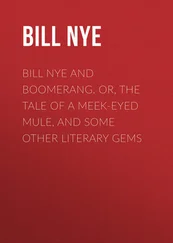Bill Nye - Bill Nye's Cordwood
Здесь есть возможность читать онлайн «Bill Nye - Bill Nye's Cordwood» — ознакомительный отрывок электронной книги совершенно бесплатно, а после прочтения отрывка купить полную версию. В некоторых случаях можно слушать аудио, скачать через торрент в формате fb2 и присутствует краткое содержание. Издательство: Иностранный паблик, Жанр: foreign_prose, foreign_humor, на английском языке. Описание произведения, (предисловие) а так же отзывы посетителей доступны на портале библиотеки ЛибКат.
- Название:Bill Nye's Cordwood
- Автор:
- Издательство:Иностранный паблик
- Жанр:
- Год:неизвестен
- ISBN:нет данных
- Рейтинг книги:4 / 5. Голосов: 1
-
Избранное:Добавить в избранное
- Отзывы:
-
Ваша оценка:
- 80
- 1
- 2
- 3
- 4
- 5
Bill Nye's Cordwood: краткое содержание, описание и аннотация
Предлагаем к чтению аннотацию, описание, краткое содержание или предисловие (зависит от того, что написал сам автор книги «Bill Nye's Cordwood»). Если вы не нашли необходимую информацию о книге — напишите в комментариях, мы постараемся отыскать её.
Bill Nye's Cordwood — читать онлайн ознакомительный отрывок
Ниже представлен текст книги, разбитый по страницам. Система сохранения места последней прочитанной страницы, позволяет с удобством читать онлайн бесплатно книгу «Bill Nye's Cordwood», без необходимости каждый раз заново искать на чём Вы остановились. Поставьте закладку, и сможете в любой момент перейти на страницу, на которой закончили чтение.
Интервал:
Закладка:
Galileo also invented the thermometer, the microscope, and the proportional compass. He seemed to invent things, not for the money to be obtained in that way, but solely for the joy of being first on the ground. He was a man of infinite genius and perseverance. He was also very fair in his treatment of other inventors. Though he did not personally invent the rotary motion of the earth, he heartily indorsed it and said it was a good thing. He also came out in a card in which he said that he believed it to be a good thing, and that he hoped some day to see it applied to the other planets.
He was also the inventor of a telescope that had a magnifying power of thirty times. He presented this to the Venetian senate, and it was used in making appropriations for river and harbor improvements.
By telescopic investigation Galileo discovered the presence of microbes in the moon, but was unable to do anything for it. I have spoken of Mr. Galileo all the way through this article informally, calling him by his first name, but I feel so thoroughly acquainted with him, though there was such a striking difference in our ages, that I am almost justified in using his given name while talking of him.
Galileo also sat up nights and visited with Venus through a long telescope which he had made himself from an old bamboo fishing-rod.
But astronomy is a very enervating branch of science. Galileo frequently came down to breakfast with red, heavy eyes; eyes that were swollen full of unshed tears. Still he persevered. Day after day he worked and toiled. Year after year he went on with his task till he had worked out in his own mind the satellites of Jupiter and placed a small tin tag on each one, so that he would know it readily when he saw it again. Then he began to look up Saturn's rings and investigate the freckles on the sun. He did not stop at trifles, but went bravely on till everybody came for miles to look at him and get him to write something funny in their albums. It was not an unusual thing for Galileo to get up in the morning, after a wearisome night with a fretful new-born star, to find his front yard full of autograph albums. Some of them were little red albums with floral decorations on them, while others were the large plush and alligator albums of the affluent. Some were new and had the price-mark still on them, while others were old, foundered albums, with a droop in the back and little flecks of egg and gravy on the title-page. All came with a request for Galileo "to write a little, witty, characteristic sentiment in them."
Galileo was the author of the hydrostatic paradox and other sketches. He was a great reader and a fluent penman. One time he was absent from home, lecturing in Venice for the benefit of the United Aggregation of Mutual Admirers, and did not return for two weeks, so that when he got back he found the front room full of autograph albums. It is said that he here demonstrated his great fluency and readiness as a thinker and writer. He waded through the entire lot in two days with only two men from West Pisa to assist him. Galileo came out of it fresh and youthful, and the following night he was closeted all night with another inventor, a wicker-covered microscope, and a bologna sausage. The investigations were carried on for two weeks, after which Galileo went out to the inebriate asylum and discovered some new styles of reptiles.
Galileo was the author of a little work called "I Discarsi e Dimas-Trazioni Matematiche Intorus a Due Muove Scienze." It was a neat little book, of about the medium height, and sold well on the trains, for the Pisan newsboys on the cars were very affable, as they are now, and when they came and leaned an armful of these books on a passenger's leg and poured a long tale into his ear about the wonderful beauty of the work and then pulled in the name of the book from the rear of the last car, where it had been hanging on behind, the passenger would most always buy it and enough of the name to wrap it up in.
He also discovered the isochronism of the pendulum. He saw that the pendulum at certain seasons of the year looked yellow under the eyes, and that it drooped and did not enter into its work with the old zest. He began to study the case with the aid of his new bamboo telescope and wicker-covered microscope. As a result, in ten days he had the pendulum on its feet again.
Galileo was inclined to be liberal in his religious views, and more especially in the matter of the scriptures, claiming that there were passages in the bible which did not literally mean what the translator said they did. This was where Galileo missed it. So long as he discovered stars and isochronisms and such things as that he succeeded, but when he began to fool with other people's religious beliefs he got into trouble. He was forced to fly from Pisa, we are told by the historian, and we are assured at the same time that Galileo, who had always been far, far ahead of all competitors in other things, was equally successful as a fleer.
Galileo received but 60 scudi per year for his salary at Pisa, and a part of that he took in town orders, worth only 60 cents on the scudi.
Methuselah
I have just been reading James Whitcomb Riley's response to "the old man" at the annual dinner of the Indianapolis Literary club, and his reference to Methuselah has awakened in my mind many recollections and reminiscences of that grand old man. We first met Methuselah in the capacity of a son. At the age of 65, Enoch arose one night and telephoned his family physician to come over and assist him in meeting Methuselah. Day at last dawned upon Enoch's happy home, and its first red rays lit up the still redder surface of the little stranger. For three hundred years Enoch and Methuselah jogged along together in the capacity of father and son. Then Enoch was suddenly cut down. It was at this time that little Methuselah first realized what it was to be an orphan. He could not at first realize that his father was dead. He could not understand why Enoch, with no inherited disease, should be shuffled out at the age of 365 years. But the doctor said to Methuselah: "My son, you are indeed fatherless. I have done all I could, but it is useless. I had told Enoch many a time that if he went in swimming before the ice was out of the creek it would finally down him, but he thought he knew better than I did. He was a headstrong man, Enoch was. He sneered at me and alluded to me as a fresh young gosling, because he was 300 years older than I was. He has received the reward of the willful, and verily the doom of the smart Aleck is his."
Methuselah now cast about him for some occupation which would take up his attention and assuage his wild, passionate grief over the loss of his father. He entered into the walks of men and learned their ways. It was at this time that he learned the pernicious habit of using tobacco. We can not wonder at it when we remember that he was now fatherless. He was at the mercy of the coarse, rough world. Possibly he learned to use tobacco when he went away to attend business college after the death of his father. Be that as it may, the noxious weed certainly hastened his death, for 600 years after this we find him a corpse!
Death is ever a surprise, even at the end of a long illness and after a ripe old age. To those who are near it seems abrupt; so to his grand-children some of whom survived him, his children having died of old age, the death of Methuselah came like a thunderbolt from a clear sky.
Methuselah succeeded in cording up more of a record such as it was, than any other man of whom history informs us. Time, the tomb-builder and amateur mower, came and leaned over the front fence and looked at Methuselah, and ran his thumb over the jagged edge of his scythe, and went away whistling a low refrain. He kept up this refrain business for nearly ten centuries, while Methuselah continued to stand out amid the general wreck of men and nations.
Читать дальшеИнтервал:
Закладка:
Похожие книги на «Bill Nye's Cordwood»
Представляем Вашему вниманию похожие книги на «Bill Nye's Cordwood» списком для выбора. Мы отобрали схожую по названию и смыслу литературу в надежде предоставить читателям больше вариантов отыскать новые, интересные, ещё непрочитанные произведения.
Обсуждение, отзывы о книге «Bill Nye's Cordwood» и просто собственные мнения читателей. Оставьте ваши комментарии, напишите, что Вы думаете о произведении, его смысле или главных героях. Укажите что конкретно понравилось, а что нет, и почему Вы так считаете.












